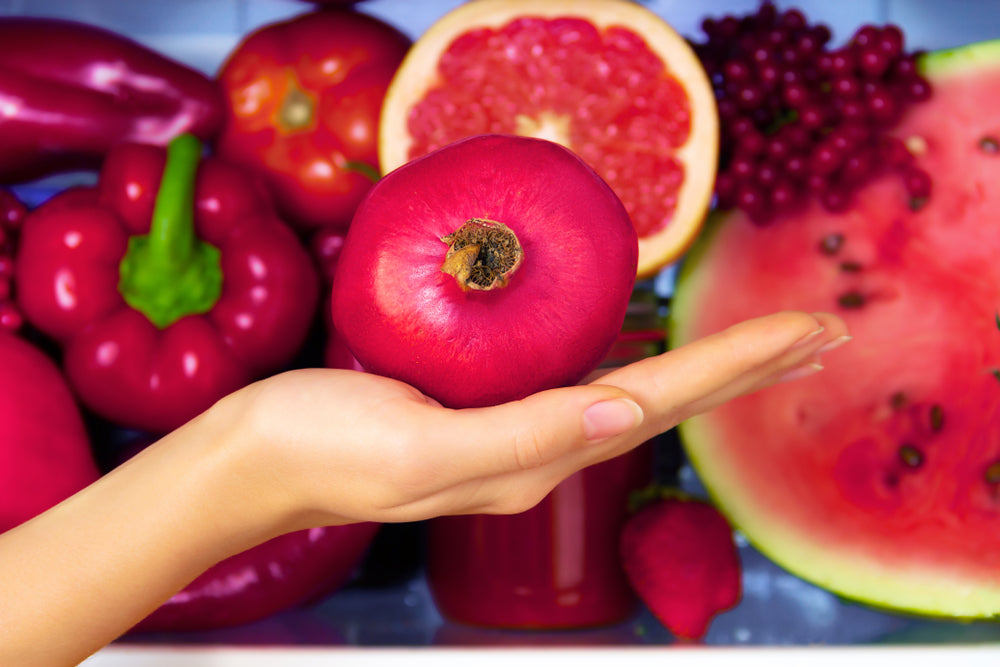
How To Add More Antioxidants To Your Life
We never stop talking about how important antioxidants are. Like, literally never. But we do feel very strongly that you need more antioxidants in your life, in your diet and in your skincare.
Being alive is essentially being trapped in a free radical ridden hellscape. What are free radicals, you ask? They are not a specific subtype of activist, they are molecules that are missing an electron. This makes them shoot around like mad things looking to find an electron.
They then latch on to healthy cells to steal the electron from each healthy cell. When the electron is stolen from a healthy cell, that healthy cell is then missing an electron and so the cycle continues!
This process causes a little thing called oxidative stress. Oxidative stress is the thing that leads to your skin looking a whole lot older a whole lot faster and is the technical term for an imbalance of how many free radicals there are in comparison to your antioxidant defence.
Both internally and externally, you need antioxidants to defend from free radical damage and placate those wily free radicals.
Antioxidants on top: our favourite antioxidant serums
We would usually recommend a serum as your best mode of topical antioxidant protection, as they can penetrate deeper and some will provide longer-lasting protection due to slow-release systems.
Neostrata Bionic Face Serum (€50.00)

Maybe not what you thought of when you think of antioxidant serum… But it is actually super potent. Featuring 10% of the polyhydroxy acid lactobionic acid, this serum simultaneously improves skin texture, wrinkles, pore size, laxity and pigmentation whilst providing your skin with antioxidant protection. Lactobionic acid isn’t the only antioxidant in there either - there’s also pro-vitamins A, C & E.
It’s fragrance-free, dye-free and gentle whilst being powerful, as well as suitable for use during pregnancy.
Environ SkinEssentiA VitaAntioxidant AVST Gel or Moisturisers 1-5 (€57.00 - €62.00)

Everyone outside of those who are pregnant or planning are recommended a vitamin A serum, and we will be honest, it’s nearly always from the Environ AVST range. Vitamin A is one of our nerdie signatures and we love getting it on as retinyl palmitate, which sets Environ (and Skingredients) apart from other vitamin A collections.
You know about it’s skin repairing and correcting qualities… But did you know it’s full of potent antioxidants, like vitamins A and C?
(Ps. Have you watched Jenn and Grainne’s informative videos on some of the products we stock? Click here to binge ‘em).
ASAP Skincare Super C Serum (€65.00)

Vitamin C is one of the most well-known and well-researched potent antioxidants and it is famous for working particularly well in formulations with other antioxidants.
The (new to us) ASAP Skincare Super C Serum combines vitamin C with idebenone - a synthetic analogue of coenzyme Q10 or CoQ10 - and pycnogenol, a natural source of potent plant antioxidants.
This is the ideal antioxidant serum for someone who wants brighter, more even skin, protection against pigment and antioxidant protection, but it isn’t ideal for congested skins.
Antioxidants on the inside: foods and supplements to protect you internally
The issue with free radicals is that we also breathe in, eat and drink things that allow free radicals to roam around inside us willy-nilly. As serums can’t get into your bloodstream, you need to fill your diet with antioxidants to give yourself a fighting chance against those pesky free radicals.
To be honest, you are getting antioxidants through your diet even if you’re not consciously seeking them out, but you can always use more.
When it comes to the type of antioxidants to get in through your food, vitamins A, C & E have the most proof behind them when it comes to in vivo research (research on whole, living entities). Antioxidant phytochemicals, including polyphenols, though proven to be effective in in vitro research (research carried out on biological microorganisms, cells or molecules outside of their usual habitat or living environment), are thought to have negligible antioxidant effects in real life.
Although we know that phytochemicals such as flavonoids, carotenoids, polyphenols or lignans (too nerdie?) have antioxidant benefits, scientists aren’t sure how much we actually need of these individual chemicals as hoomans to reap these benefits.
Essentially, it’s a tricky topic, but we’ll outline which antioxidant foods contain which type of antioxidant so that you can make your own decisions.

Some antioxidant foods to start adding to your shopping basket are…
- Carrots, pumpkin, mangoes and spinach (beta carotene, a carotenoid that gives plants pigment - technically a phytochemical but the body can convert it to vitamin A)
- Berries, broccoli, mangoes, oranges, spinach and peppers (vitamin C)
- Sunflower seeds, nuts, avocado (yum), whole grains (vitamin E)
- Watermelon, tomatoes, grapefruit (lycopene, another carotenoid)
- Green tea, pomegranate, black tea, red wine (flavonoids, also a polyphenolic phytochemical group)
- Turmeric - or specifically, curcumin as found in turmeric (beta carotene, vitamin C and flavonoids)
There are obviously many other sources but this is a good place to start.
Antioxidant supplements
If you feel that you’re not getting enough antioxidants in through your diet, turn to supplements.
Advanced Nutrition Programme Skin Antioxidant (€39.00, 60 capsules) contains 2.5mg of beta carotene, bilberry fruit, turmeric root, green tea extract, grapeseed extract and lutein and lycopene.
If you are fully sold on turmeric - or again, curcumin - being the antioxidant to bet on, Solgar’s Full Spectrum Curcumin Soft Gels (€35.00, 30 soft gels) has made fat-soluble curcumin water-soluble, meaning your body can take it 15x better than it could as a regular food source.
Your vitamin A or vitamin C supplement will have you covered either, but remember that it’s not advised to take vitamin A when pregnant, planning or breastfeeding.
